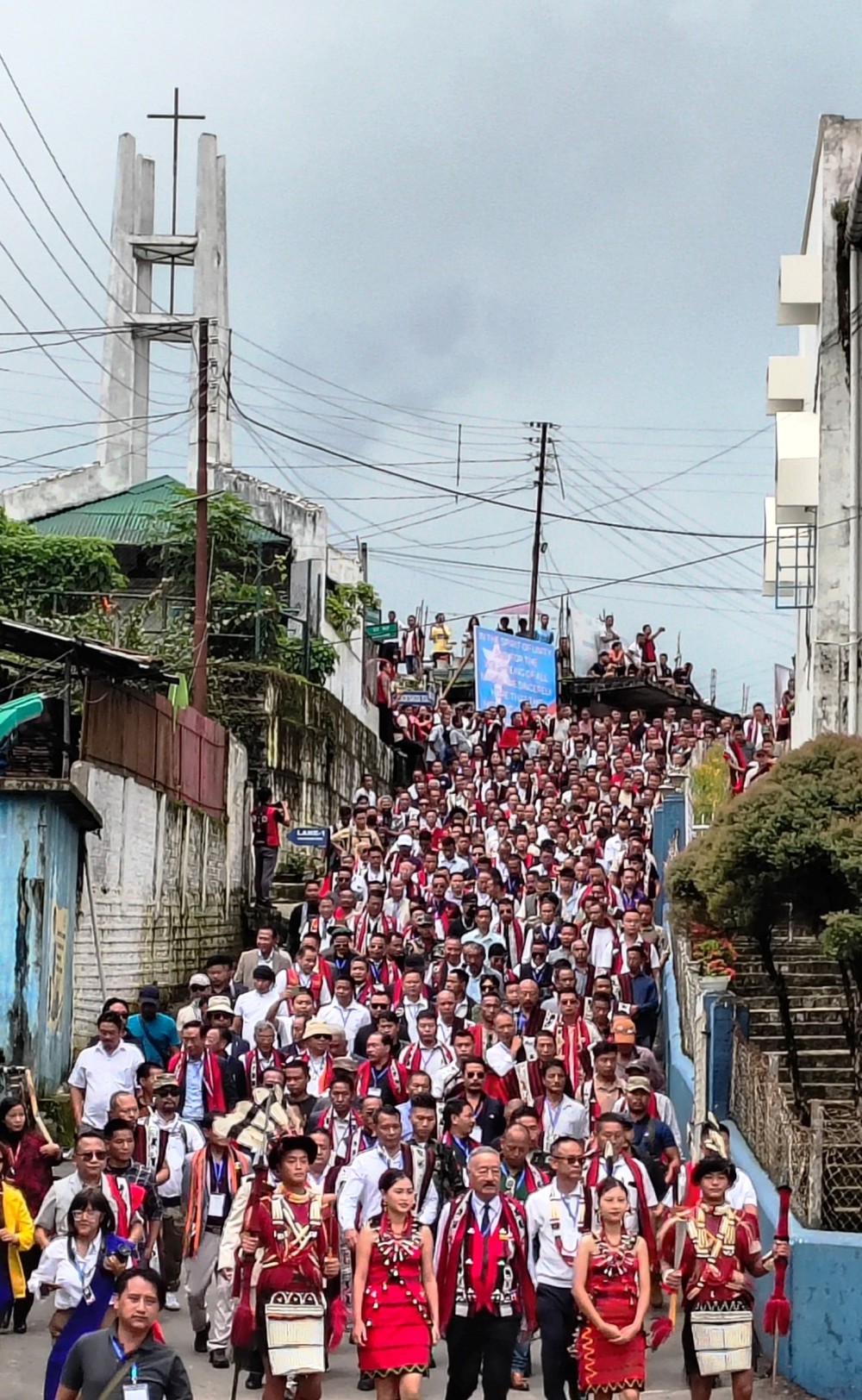On August 23, 2025, the Ao Senden hosted, in Ungma Village, the meeting of the Council of Naga Cooperation and Relationship comprising of representatives from the Naga Tribe Hohos, Naga Political Groups (NPGs), and the Forum for Naga Reconciliation (FNR).

Political authority should stem from the people, the People United shall Always be victorious
Shinglai Thothuingam
When the Forum for Naga Reconciliation (FNR) convened its latest gathering at Ungma village in Mokokchung, it did more than stage another reconciliation ritual. It signalled a quiet but significant shift in the Naga political struggle, long trapped in factional rivalries and elite negotiations, it is beginning to take on the character of a people’s movement for unity and healing. It offered a reminder that has been obscured through decades of conflict, sovereignty, in the truest sense, lies with the people and in Naga context, sovereignty has been framed not just in political-legal terms (independence, self-determination) but also in moral-spiritual terms, the right of a people to govern themselves, live in dignity, and reconcile divisions. For decades, sovereignty was claimed by armed groups or negotiated with the Indian state. The Ungma reconciliation meeting reframes it: sovereignty is not the property of factions, nor is it granted by Delhi, it is inherent in the Naga people themselves. This echoes both global democratic traditions (Locke, Hobbes, Rousseau) and indigenous traditions, where the community is the custodian of authority. The Ungma reconciliation gathering reminded Nagas and the wider world of a simple truth: sovereignty lies with the people.
The Journey of FNR
Since its inception in 2008as a civil society initiative, FNR has consistently pursued the difficult task of persuading divided Naga political groups to engage in dialogue, forgiveness, and cooperation. To bring various Naga armed/political groups (especially the different NSCN factions) together under a shared vision of reconciliation and unity. Critics often dismissed its efforts as symbolic, because the results were far from satisfaction then. However, post Ungma, the legitimacy of FNR is gaining grounds-in the perception and acceptance. The conflict within the FNR and Naga political groups is less about the principle of reconciliation—which almost all agree upon but more about questions of legitimacy, power-sharing, and political vision. The way forward may lie in reframing reconciliation not merely as a truce among factions but as a people’s mandate for a united political future, where sovereignty is reinterpreted as residing in the collective will of the Nagas. By gathering thousands of people in a single act of reconciliation, the FNR made visible what was always latent: the people, not the factions, are the true custodians of Naga sovereignty. Out of many political groups-factions within the Nagas, without any prejudice, sharing common platform is a foundation for peace. The effort of FNR must be appreciated and many more of such meaningful gatherings should be organised in various parts of Naga ancestral homeland. However, the real protagonists of the meeting were ordinary citizens-youth, women, elders, tribal leaders, and Church representatives.
Redefining Sovereignty. The Naga struggle has historically centred on political sovereignty- the right to self-determination, the demand for integration of all Naga-inhabited areas, and recognition of a distinct-Unique history. While these remain deeply felt aspirations, the Ungma gathering pointed to a broader reality: sovereignty is also about dignity, reconciliation, and healing the scars of fratricidal conflict. When Nagas across tribes and regions come together in fellowship, they exercise a form of sovereignty more profound than any political accord — the sovereignty of a people choosing unity over division.
Why This Matters? We are in crisis period, on Framework Agreement and Agreed position, over within the constitution of India and outside. On the position of separate flag and constitution of the Nagas. We are in an era where fake news and pseudo Nationalist-wolf in sheep cloths has become so normal that people get offended by honesty and true nationalist. Social media and flow of unverified information- concocted by adversaries on half-truth and half lies basis are shaping the perceptions of the people. But Ungma reconciliation carries profound shift and implications to all the thesis and anti-thesis on Naga movement. For Delhi, it means that the Naga question cannot be reduced to negotiations with armed groups alone. Any lasting settlement must account for the people’s moral will. For Naga political leaders, it is a reminder that their legitimacy flows not from the barrel of a gun or the secrecy of talks, but from the sovereignty vested in the people. And for ordinary Nagas, it is an empowering realization: reconciliation is not a favour granted by leaders, but a right and responsibility owned by the people themselves.
Challenges Ahead
Nagas unity remains fragile. Political divisions persist, regional differences complicate the search for common ground, and negotiations with India remain unresolved. Skepticism abounds, for past declarations of reconciliation have not always been translated into sustained trust. After decades of conflict and talks, “peace fatigue” has set in among the people. Prolonged delays reduce public trust; the urgency of Naga movement lies with the Nagas and not with Delhi-the urgency to reconcile and the urgency to bring peace.
Conclusion: In the end, Ungma may be remembered as a moment when the Naga struggle rediscovered its foundations. It is significant precisely because it shifted the centre of gravity. Even if factions falter, the people have shown they can claim the authority to demand unity. The Nagas are not blind to the legitimacy of its movement. For too long, sovereignty has been debated in terms of boundaries, accords, and factional claims. But Ungma demonstrated that sovereignty begins with the people’s voice, their longing for unity, and their power to forgive. If this spirit holds, the Naga struggle will not just be a story of negotiations, but of a people reclaiming their own destiny. Unless political groups genuinely reimagine their roles in relation to the public, Ungma risks being another symbolic moment rather than a breakthrough. Sovereignty is not merely the subject of political bargains; it is rooted in the people — in their faith, their culture, and their determination to live as one. The lesson of Ungma is clear: sovereignty lies with the people. If this truth continues to guide the movement, the Naga struggle may finally find the reconciliation and dignity it has long sought.





